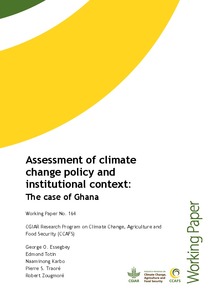Assessment of climate change policy and institutional context: the case of Ghana
 Mainstreaming climate change strategies on the basis of Science, Technology and Innovation (STI) into agricultural food security policies demands multi-dimensional approaches. In sub-Saharan Africa, the demand is made more complex by the socioeconomic challenges such as poverty, unstable markets, limited opportunities for employment and livelihoods. Mainstreaming therefore has to be done on the basis of informed strategies formulated on comprehensive studies. This study was conducted to inform the strategies for science-based and climate-smart agriculture in Ghana,
especially with reference to the policy and institutional framework. The methodology comprised desk research of policy documents and related publications and Key Informant Interviews (KII). The study was based on the CCAFS Platform areas in Upper West Region. The research shows that though some efforts were made in the specific case of the National Climate Change Policy (NCCP), inclusion in the process did not reach the grassroots. Thus there were weaknesses in harnessing societal grassroots’ inputs for the policy formulation process. Still the policy has been well formulated and successfully launched. However, there is lack of awareness and knowledge about the policy especially in the decentralized levels of society in the districts and policy literacy is very low. The situation poses a challenge to effective implementation of the NCCP. To address some of the key challenges identified, it is vital to strengthen the vertical and horizontal channels of policy communication. The communication from the national sources to the districts must be improved through more frequent interaction. In the regions and districts, horizontal communication to reach out to all stakeholders can be greatly facilitated by the use of the electronic media.
Mainstreaming climate change strategies on the basis of Science, Technology and Innovation (STI) into agricultural food security policies demands multi-dimensional approaches. In sub-Saharan Africa, the demand is made more complex by the socioeconomic challenges such as poverty, unstable markets, limited opportunities for employment and livelihoods. Mainstreaming therefore has to be done on the basis of informed strategies formulated on comprehensive studies. This study was conducted to inform the strategies for science-based and climate-smart agriculture in Ghana,
especially with reference to the policy and institutional framework. The methodology comprised desk research of policy documents and related publications and Key Informant Interviews (KII). The study was based on the CCAFS Platform areas in Upper West Region. The research shows that though some efforts were made in the specific case of the National Climate Change Policy (NCCP), inclusion in the process did not reach the grassroots. Thus there were weaknesses in harnessing societal grassroots’ inputs for the policy formulation process. Still the policy has been well formulated and successfully launched. However, there is lack of awareness and knowledge about the policy especially in the decentralized levels of society in the districts and policy literacy is very low. The situation poses a challenge to effective implementation of the NCCP. To address some of the key challenges identified, it is vital to strengthen the vertical and horizontal channels of policy communication. The communication from the national sources to the districts must be improved through more frequent interaction. In the regions and districts, horizontal communication to reach out to all stakeholders can be greatly facilitated by the use of the electronic media.
